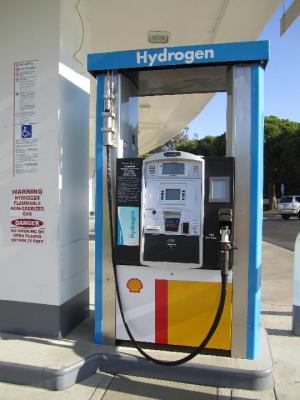
In every comment section, there’s always one. No matter the electric vehicle, no matter how far the technology has come, there’s always one.
“Only 500 miles of range? Electric cars are useless! Me, and everyone I know, drives 502 miles every day at a minimum! Having to spend more than 3 minutes to recharge is completely offensive to my entire way of life. Simply not practical, and never will be.”
Yes, it’s true, electric cars do have limited range and can take a little longer to recharge than a petrol or diesel powered vehicle. Improvements continue at a rapid pace, but it’s not enough for some.
To these diehards, hydrogen fuel cell vehicles may have some attractive benefits. By passing hydrogen gas through a proton-exchange membrane, electricity can be generated cleanly with only water as a byproduct. The technology holds a lot of promise for powering vehicles, but thus far hasn’t quite entered our daily lives yet. So what is the deal with hydrogen as a transport fuel, and when can we expect to see them in numbers on the ground?
Finally, A Clean Fuel?
Hydrogen is the most abundant element in the universe, as far as we currently understand it, and is present in great quantities in our oceans too. Readily available through the electrolysis of water and other chemical methods, it has yet to be used as a mainstream fuel. Hydrogen has many benefits, but also a few key drawbacks, and these all impact its potential use in vehicles.
Pros
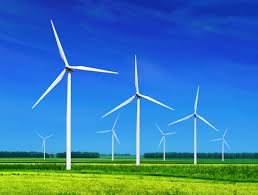
Hydrogen is easy to find – every water molecule has two hydrogen atoms just sitting there, ripe for the taking. The simplest way to obtain it in pure form is through electrolysis, which can be a relatively clean process when powered by renewable sources of electricity. In many processes, it can also be used as a fuel while creating minimal pollution. When used to generate electricity in a fuel cell, the only byproduct is pure water. As the clock ticks down in the race to prevent irreversible climate crisis, these attributes make hydrogen a highly attractive choice for future energy needs.
As far as vehicles are concerned, being a liquid fuel, hydrogen has a big leg up on battery technologies. Refilling a tank can be achieved in a handful of minutes, something not yet possible with even the fastest charging electric vehicles. This promises to ease long trips and remove the spectre of range anxiety.
Cons
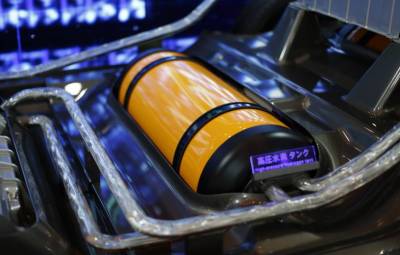
Hydrogen is highly flammable, something that humanity usually prizes in its liquid fuels. However, combined with the difficulty of containing the tiny atoms, this flammability is an outsized risk when handling hydrogen. Additionally, to store hydrogen in a compact and practical way for transport and energy use requires placing it under immense pressure, further compounding the problem.
Thus far, hydrogen also faces the classic chicken-and-egg problem of infrastructure. There are few hydrogen vehicles on the road, so there is little incentive to invest in a network of hydrogen refuelling stations. Conversely, as there are few refuelling stations, there is little demand for hydrogen vehicles.
The problems extend to distribution, as well. Unlike electricity, which can be sent down simple wires, hydrogen has to be delivered through tankers or pipelines. For trucks, safe storage is a problem once more, along with the fact that carting hydrogen around necessarily takes energy. Pipelines pose further problems, as hydrogen tends to cause embrittlement in metals and requires special management to deliver safely. We’ve covered the topic before, discussing the potential for domestic use of hydrogen in the UK.
The Current State of Play
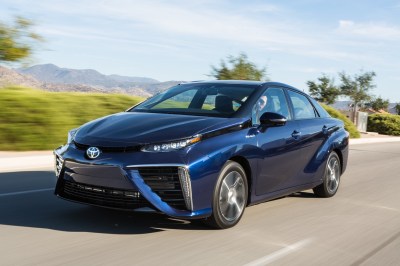
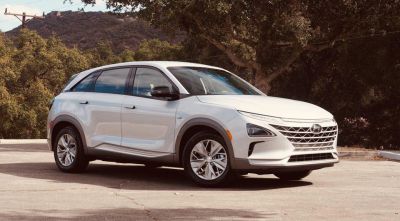
There’s a long list of hangups holding hydrogen back from the mainstream. On top of this, the automotive industry has invested heavily in battery electric technologies. As the range of battery electric vehicles increases, and recharge times drop, the main competitive advantage of hydrogen fuel cell vehicles is being eroded, all before they hit the marketplace in real numbers.
Despite this, there are hydrogen vehicles on the market today. Hyundai are currently selling their new Nexo fuel cell vehicle in Europe, with limited numbers reaching Australia and California. Toyota have been selling the Mirai in markets with suitable infrastructure since 2014, and Honda’s FCX Clarity has also been available on a series of limited lease programs since 2008. Automakers have thus far kept a tight leash on these vehicles, as it remains impractical to sell them in areas without hydrogen refuelling stations. Unlike electric vehicles, installing a refuelling station at a customer’s home isn’t really an option either, further limiting the rollout.
Prices of fuel cell vehicles are exceptionally high, too – with a Nexo SUV retailing around $60,000 USD. This is largely due to the high cost of the fuel cell technology, which relies heavily on platinum and doesn’t yet enjoy the benefits of economies of scale. While stunts like making a cup of tea with fuel cell exhaust are amusing, it seems that consumer demand remains too low to push wider acceptance.
Potential For The Future

With EV recharging stations beginning to spread like wildfire, and ranges increasing with each new model, it may seem that battery EVs have an unassailable lead. With that said, there are still many edge cases where humble hydrogen may yet find its place in the market.
Battery EVs are great for urban commuters who travel only short distances each day. At the same time, for those stuck street parking on a regular basis, accessing charging infrastructure can be incredibly frustrating. Those with parking at their apartments may struggle to lobby for charger installation, too. For these people, the idea of a simple weekly fill up is far more palatable than spending an hour a week sitting at the service station.
Another area which may be well served by hydrogen is in larger vehicles. Buses and trucks often travel long distances in a single day. Drivers and operators don’t always have the time to take a vehicle out of commission to charge for hours, either. In these applications, hydrogen may serve as an easy way to reduce emissions. Additionally, many of these vehicles are operated out of depots serving many vehicles, which are already set up for refuelling. Installing hydrogen infrastructure on site would be relatively simple for a single refuelling point such as this.
There’s also the potential for fuel cells to act as a range-extender for battery electric vehicles. Whether as an add-on module, or an option at order time, it would be simple to integrate fuel cells into an electric vehicle to enable it to undertake longer trips without having to charge for excessively long periods.
While hydrogen doesn’t look like it will knock battery EVs out of the market any time soon, it may yet find its place in the market. Whether in heavy haulage, or as an alternative to batteries, it’s likely to be around for a while yet. Only time will tell!

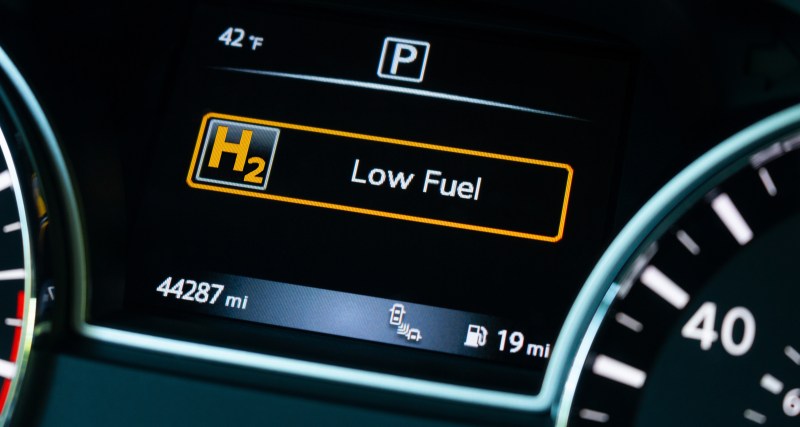














“By passing hydrogen gas through a proton-exchange membrane, electricity can be generated cleanly with only water as a byproduct.”
and the byproducts of producing hydrogen are exactly what?
see, this is why we can’t have nice things anymore. nobody thinks beyond 2 feet around themselves
Yes they are. I just had the opportunity to test drive the new Hyundai Nexo and I liked it. I hope more manufacturers make hydrogen fuel cell vehicles.
https://mgreviews.com/2019/08/12/review-2019-hyundai-nexo/
Fuel cell tech is only likely for fleets of large trucks and trains. Nobody wants to drive a hydrogen bomb, and the cost is always going to be prohibitive. I imagine all this hydrogen talk is fuelled by the oil industry, who are desperate to put off the EV future as long as possible….
Hahaha, ride the bomb.. Facts never bother me either..
Hydrogen tanks have limited capacity, and even if they leak AND catch fire, it will go out quickly.
Often before any first responder shows up.
Another annoying thing about hydrogen, it hates being away from oxygen
Any leak of hydrogen tries to recombine with oxygen and creates a large cloud of water vapor.
Whats amazing, those grain elevators in the mid west, (USA) explode more than they should.
I don’t see agitators walking the streets trying to shut down flour mills.
When they go into full scale mass production, fuel cell cars will be more affordable than 300 mile battery electrics. The real hurdle is making them competitive with regular gasoline cars.
GM just announced a 400 mile range EV..
Oh stop with the Hydrogen Fuel Cell, a vehicle can run on Hydrogen alone, has already been done. If the powers to be were really serious about ridding the world of pollution then they would let the technology florish.
The “Real Problem” is where ti refill the small tanks..
Gasoline has the edge in availability, worldwide.
To compete would require too large of an investment.
So, fuel cell cars are and will remain, an niche market for the elite.